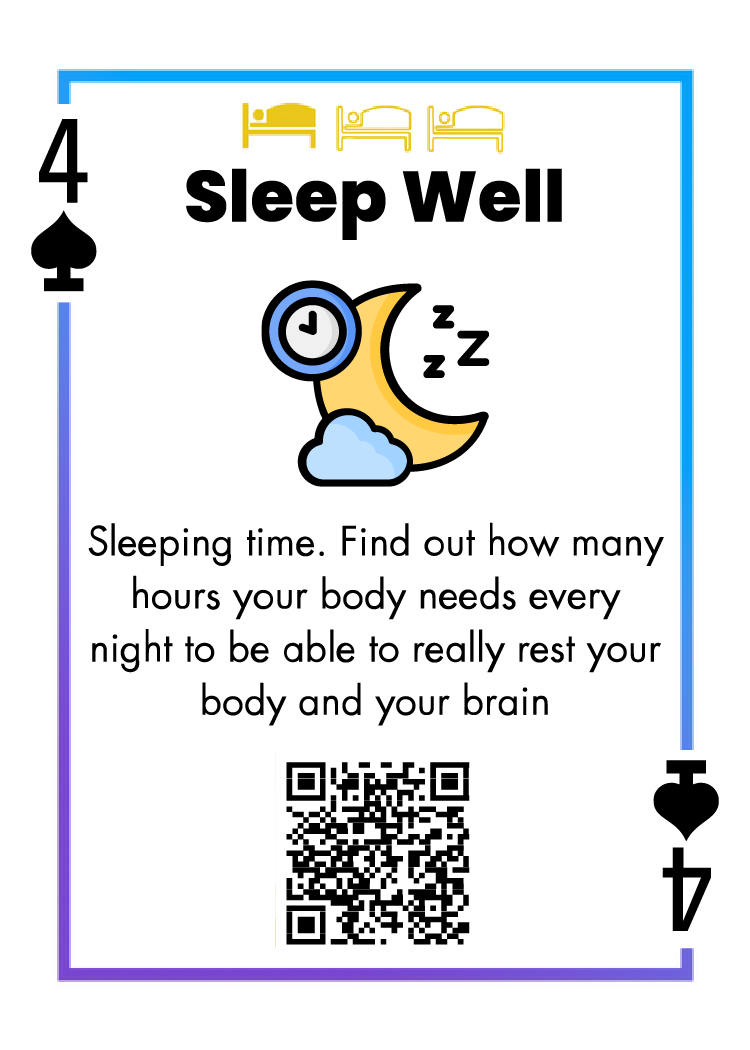The 1% Club




4 of Spades
Hours of Sleep

Most school-aged children
need between 9 to 12 hours of sleep each night.1
This week, try going to bed and waking up at the same time every day!
- To figure out your bedtime, start with the time you need to wake up and count back 9 to 12 hours.
- For example, if you need to wake up at 7 AM, aim to go to bed between 7 PM and 10 PM.
- Creating a bedtime routine can help you unwind and get a restful night’s sleep.
Getting 9 to 12 hours of sleep each night is important because it keeps your body and brain healthy. With enough sleep, you’ll feel more energetic and ready for the day. It helps you focus better in school and boosts your mood, making everything more enjoyable.
Not getting enough sleep is linked with differences in brain structure, problems with mood and critical thinking compared to those getting enough sleep.2
It also affects your emotions, energy levels and growth. All of these are super important in daily life!3
Small changes CAN make a big difference – that’s what The 1% Kids’ Club is all about.
Interesting websites to check out with your parents:
Sleep Strategies for Children | Sleep Foundation
The 9 Apps You Need to Help Your Kids Fall Asleep and Make Bedtime Less Stressful (makeuseof.com)
- Encourage students to play outside and get active during the day. Physical activity helps them burn off energy and can improve their sleep at night.
- Dedicate a brief 10-minute session between classes to teach children about the importance of sleep. You can also use reminders around the classroom to reinforce this message.
- Minimise their caffeine consumption after lunch, like coffee, soda or chocolate. Aim to have dinner at least a few hours before bedtime, to allow for proper digestion. Certain foods, like a warm glass of milk, can promote better sleep.
- Avoid vigorous exercise close to bedtime, as it can make it harder to fall asleep. Encourage activity earlier in the day!
- Limiting the use of electronic devices before bed and choosing reading a book instead can further support a restful night.
- Optimal sleep will change for each child, give them control of their routine on a weekend and discover how much rest their body needs.4
- If your child is struggling to sleep, check out resources like: Sleep | KidsHealth NZ for more information.
- (2023). Sleep hygiene in children and young people. GOSH Hospital Site.
https://www.gosh.nhs.uk/conditions-and-treatments/procedures-and-treatments/sleep-hygiene-children/ - Contie, V. (2022, August 30). Children’s sleep linked to brain development. National Institutes of Health (NIH).
https://www.nih.gov/news-events/nih-research-matters/children-s-sleep-linked-brain-development - Pacheco, D. (2018, October 17). How Memory and Sleep Are Connected. Sleep Foundation.
https://www.sleepfoundation.org/how-sleep-works/memory-and-sleep#references-78259 - Matricciani, L., Blunden, S., Rigney, G., Williams, M. T., & Olds, T. S. (2013). Children’s Sleep Needs: Is There Sufficient Evidence to Recommend Optimal Sleep for Children? Sleep, 36(4), 527–534.
https://doi.org/10.5665/sleep.2538

